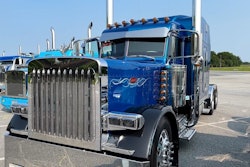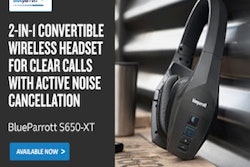Don’t let unfavorable loan terms force you to pay more than you need.
THIS ARTICLE IS FROM the 2006 edition of the Overdrive Partners in Business manual, co-written by American Truck Business Services, presenter of the Partners in Business seminars. The program is sponsored by Freightliner Trucks and Castrol. The next seminar will be Aug. 25, during the Great American Trucking Show in Dallas. To order a manual, call (800) 633-5953, Ext. 1135. Visit this site for more excerpts and program information.
Financing a truck can be frustrating, confusing and time-consuming, especially for first-time buyers. It also can be costly if you are not prepared. The more deliberate you are about this process, the better position you will be in. Give yourself plenty of time to shop for a truck and for favorable financing. Visit dealers and ask questions. Know what risk you present for a potential lender.
Get a copy of your credit report before you attempt to secure equipment financing. Your credit history could contain wrong or hurtful information that you’ll want to explain to a potential lender. Always be up front about your problems. Showing that you have overcome hard times demonstrates determination and strong character.

When you apply for a loan, be prepared to provide as much information as you can. The more you tell a potential lender about yourself and your operation, the more comfortable he may be lending you the money.
Show that you are a business owner first and a truck operator second. You’ll need a budget, a business plan and a cash-flow statement. If you aren’t comfortable creating these documents on your own, ask for help from your business services provider.
A detailed budget will assure the lender that you can meet the financial obligations of owning a truck. A cash-flow statement shows that your projected revenue will be sufficient to meet current obligations. A business plan outlines the details of your operation, including the types of freight you’ll haul, the traffic lanes you’ll run and the rate you’ll be paid. It also lists the name, address and telephone number of the company you plan to lease to, as well as a contact name to verify that lease.
If you plan to run independently, you’ll need to list contact information for the customers you will haul for. Bring your lender a list of credit references, even if you don’t have a perfect credit history. Include present and past creditors.
FINANCING SOURCES
Banks are not your only option for borrowing money. Check around for the lender that best suits your needs.
BANKS. Banks are reluctant to lend money for an over-the-road truck. In their opinion, “rolling collateral” is not a good risk. If you’ve been doing business at the same bank for a long time, however, and have an established relationship with a loan officer, it’s worth a try if your credit is good.
CAPTIVE LENDING INSTITUTIONS. These finance companies are owned by equipment manufacturers. They often are more willing than banks to lend money to new owner-operators because they are in the business of selling trucks.
COMMERCIAL LENDING INSTITUTIONS. These finance companies are not necessarily affiliated with truck manufacturers, but certain ones cater to the trucking industry.
USED TRUCK DEALERS. Your dealer may refer you to lenders other than captive finance arms.
GETTING THE MONEY
Interest rates can vary by two or three percentage points, or even more, which can mean a difference of thousands of dollars in interest over the life of a loan. No matter where you obtain financing, the following can affect your interest rate:
CREDIT HISTORY. Borrowers with good credit get the lowest interest rates.
STABLE JOB HISTORY. Job-hopping, especially in recent years, indicates a lack of responsibility and sends an alarm to a lender.
LONGTIME RESIDENCY. People who live at the same address for a long time usually have a better credit rating than those who move every few years.
Don’t take the first financing option you’re offered. You can negotiate loan rates just as you would haggle over the price of a truck. Interest rates vary among lenders and from one part of the country to another, and finance managers have a good deal of leeway when setting the rate for your transaction.
TWEAKING THE LOAN
Some finance companies offer creative solutions for particular situations. These options include:
VARIABLE RATES. Most truck loans have a fixed interest rate, which means that you pay the same rate throughout the term of the loan. Sometimes you can get a variable rate. This is usually a good deal if the rate holds steady or drops, but if rates go up too much for too long, you might pay more than you would have under a fixed-rate loan.
MORE PRINCIPAL UP FRONT. With this option, your monthly interest charges and total payments eventually decline. Having lower payments in the latter part of the loan helps in two ways: It gives you more cash for truck maintenance as the truck ages; and it allows you to save for your next down payment.
SKIP-PAYMENT PLAN. Designed for seasonal truckers, this plan allows you to miss one or more payments during slow freight times, or to pay a much lower amount during those months.
DELAYED PAYMENT PLAN. This provides you a lead time, perhaps three months, to begin receiving revenue before you have to start paying for your truck. It’s helpful for someone who is just beginning to operate under his own authority, who can expect a delay before his first invoices are paid.
NEGOTIATING THE DEAL
Getting a good, serviceable truck at the lowest payment possible is your goal. Before you head to the bargaining table, however, know how much you want to pay for a truck, how much you can manage per month and what interest rate you want. Then negotiate with what you consider to be the top three dealers. Never settle for the first quote. In many cases, you can bring down the price of your new rig through negotiation or specification changes.
If you’re buying a new truck, before negotiations begin, ask each dealer to provide a complete breakdown of the vehicle price, showing the list price for the chassis and every specification option, applicable taxes, transportation and dealer prep costs. Ask about dealer add-ons, such as delivery charges and pre-delivery services that could appear after you cut the deal. Make sure that your down payment or trade-in is included in the order.
Be sure that your dealership is able to service your vehicle and that warranty work and down time will have the least possible effect on your driving time and miles. Get warranty agreements in writing and make sure you fully understand them.
Find out whether warranty work can be done at any authorized shop in the nation and whether warranties cover labor, parts, towing, down time and a replacement vehicle. Make sure you understand warranty coverage in terms of time and miles. Ask how warranty work is reimbursed.
BEFORE YOU SIGN
Get full disclosure before you sign a finance contract. Make sure that the total price is clearly defined. Truth-in-lending laws do not apply to commercial loans, such as truck financing, so dealers do not have to give full disclosure, but most will if they are asked.
In addition:
- Don’t sign anything you don’t understand.
- Get a copy of everything you sign. When trading, don’t sign over the title of your truck until you take delivery of the truck you’re buying.
- Don’t finance a truck for longer than six years.
- Don’t sign a finance contract until you have a ready source of revenue. Make sure that you can put your truck to work within a few days of leaving the lot.
- Don’t automatically include insurance in the final contract. You might opt to buy it elsewhere.
- Don’t sign up automatically for credit life or credit disability insurance, which covers your truck payments if you die or become disabled. You likely can get the same type of policy on your own at a much lower rate. Consult with your insurance agent before accepting this type of coverage through your loan.
- If buying used, make sure all requested repairs are completed to your satisfaction.











